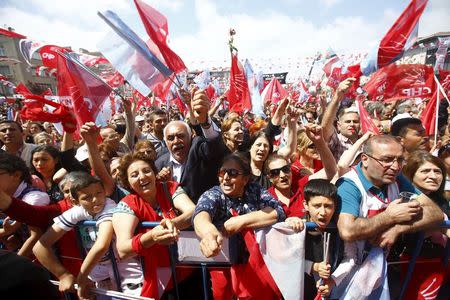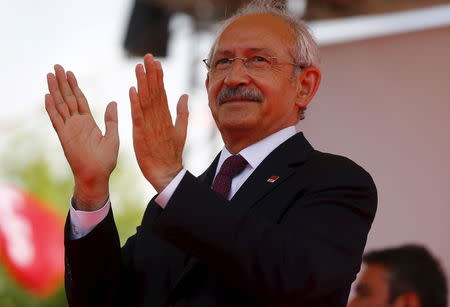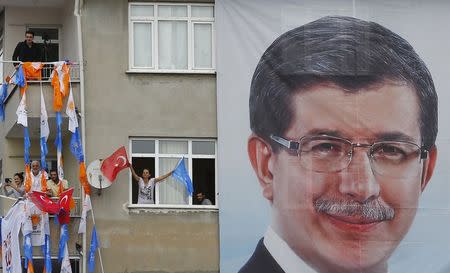Turkish volunteers flock to monitor knife-edge election
By Dasha Afanasieva ISTANBUL (Reuters) - In a meeting room above an upmarket restaurant in Istanbul's Beyoglu district, some 200 people listen as a young lawyer explains what to watch for when votes are counted in Sunday's pivotal parliamentary election. Tens of thousands of volunteers have signed up to monitor the vote, set to be the closest in more than a decade, in what organizers say is a response an erosion in the rule of law. Oy Ve Otesi ("Vote and Beyond"), was set up the aftermath of anti-government demonstrations two years ago. In last year's presidential election, it was able to monitor six cities. This time it is targeting 70,000 volunteers in 162 towns. Sercan Celebi, who quit management consultancy McKinsey to run the movement, said it was driven by diminishing trust in Turkey's institutions and inspired by the 2013 mass protests that began over government plans to build on an Istanbul park. "We finally saw there were enough people out there to make this happen," Celebi, 32, told Reuters. "It's very strongly correlated to the diminishing role of the rule of law in our society ... people are losing faith." Erdogan has tightened his grip on the judiciary, police and media in recent years. Dozens of critical journalists have faced prosecution, while citizens including a high school student have been taken to court for insulting him on social media. Turkey nonetheless has a history of broadly credible elections, with the ruling AK Party (AKP) strengthening its majority in three successive votes since 2002. Erdogan, elected last year with 52 percent after more than a decade as prime minister, wants the AKP to win enough of a majority to change the constitution and hand him executive powers. For that, the AKP would need to win three-fifths of parliament's 550 seats. The pro-Kurdish HDP could thwart those plans if it crosses the 10 percent threshold needed to enter parliament, potentially even forcing the AKP into coalition. Polls suggest it will go down to the wire and the volunteers of Oy Ve Otesi say this has fueled fears of fraud. Marketing manager Can Gokcen, 26, helping to organize the training session, said the aim was to educate voters, not influence their choice. "We tell them what their rights are. We provide them with the necessary laws," he said. Oy Ve Otesi says 75 percent of its funding comes from small donations and that it gets some help from the Swedish and Dutch consulates. Though many of the volunteers oppose the AKP, they are told to leave their political opinions at the door when they monitor the vote and insist their movement is non-partisan. The government disagrees. "We do not think that group is really independent," AKP deputy chairman Mustafa Sentop, who is in charge of the ruling party's election preparations, told Reuters. "If they are trying to cast a shadow over the ballot box, we will not allow that." MISTRUST Allegations of electoral irregularities surfaced last year, when observers said some districts in Ankara recorded a turnout of over 100 percent in a March municipal vote. Energy Minister Taner Yildiz blamed a cat in a power station for electricity outages at some voting centers, drawing ridicule on social media, although no link to fraud has been established. A study published in May by Professor Ali Carkoglu of Koc University in Istanbul found 43 percent of potential voters thought the June 7 election would not be fair. "That the sanctity of the ballot box is now an issue, in a country with a long record of fair elections, highlights a lack of confidence in the rule of law in Turkey," said Jonathan Friedman, senior associate at risk consultancy Stroz Friedberg. "These concerns are also spreading in the business community," he told Reuters. Erik Meyersson, an assistant professor at the Stockholm School of Economics who writes on Turkey, said monitoring the vote in the predominantly Kurdish southeast, where the AK Party fears a strong HDP showing, would be critical. "Just as the electoral stakes increase, so may the demand for tampering with votes (on both sides)," he wrote on his blog. Oy Ve Otesi says two-thirds of its volunteers are women and two-thirds are aged between 26 and 45. Celebi said the group would cover 45 Turkish provinces and would be "fairly strongly" represented in the southeast. Electoral laws only provide for representatives of political parties and independent candidates to monitor the vote, meaning that Oy Ve Otesi is dependent on parties for access. Celebi said the group was working with five opposition parties but that the AKP had declined, arguing that it supported democratic initiatives but had its own monitoring procedures. In the meeting room over the Beyoglu restaurant, a former Italian schoolhouse more than a century old, the volunteers are aware of the limits of their influence. "For the first time I feel responsible because I feel like there will be cheating in the elections," said copywriter Ozgun Tangla. "At least I will feel like I did what I could." (Additional reporting by Ercan Gurses in Ankara; editing by Nick Tattersall and Philippa Fletcher)



